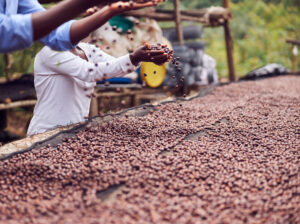
Nestled in the heart of West Africa, Cameroon boasts a diverse landscape, vibrant culture, and a burgeoning coffee industry that has been gaining recognition on the global stage. Coffee from Cameroon is celebrated for its unique flavors, high-quality beans, and the rich cultural tapestry that surrounds its production. In this article, we delve into the world of Cameroonian coffee, exploring its origins, cultivation methods, and the unique characteristics that make it stand out in the international coffee scene.
 Cameroon has a long history of coffee cultivation, dating back to the early 19th century when German settlers introduced coffee plants to the region. Over the years, coffee production has become deeply ingrained in the country’s agricultural practices, contributing significantly to its economy. Today, Cameroon is the largest coffee producer in Central Africa and is renowned for its Arabica and Robusta coffee varieties.
Cameroon has a long history of coffee cultivation, dating back to the early 19th century when German settlers introduced coffee plants to the region. Over the years, coffee production has become deeply ingrained in the country’s agricultural practices, contributing significantly to its economy. Today, Cameroon is the largest coffee producer in Central Africa and is renowned for its Arabica and Robusta coffee varieties.
The country’s diverse geography, ranging from the volcanic soils of the Western Highlands to the tropical lowlands, provides ideal conditions for coffee cultivation. The main coffee-growing regions in Cameroon include the Northwest, West, Littoral, and Southwest regions. Each region imparts its unique characteristics to the coffee, resulting in a diverse range of flavor profiles.

Cameroon produces both Arabica and Robusta coffee varieties, with each offering distinct taste experiences. Arabica beans, grown in the cooler highlands, are known for their mild acidity, floral aroma, and nuanced flavor notes. On the other hand, Robusta beans, cultivated in the warmer lowlands, are prized for their bold, full-bodied taste, low acidity, and earthy undertones. The combination of these two varieties contributes to the complexity of Cameroonian coffee blends.
In recent years, there has been a growing emphasis on sustainable and organic coffee production in Cameroon. Many smallholder farmers have adopted environmentally friendly practices, such as shade-grown cultivation and organic fertilizers, to preserve the natural ecosystem and ensure the long-term viability of their coffee farms. These efforts not only benefit the environment but also contribute to the production of high-quality, ethically sourced coffee.
Coffee holds a special place in Cameroonian culture, symbolizing hospitality and social connections. Traditional coffee ceremonies are an integral part of community gatherings, where the preparation and sharing of coffee become a ritualistic experience. The strong cultural ties to coffee underscore its importance beyond economic contributions, making it a symbol of unity and shared moments.
While Cameroonian coffee has gained recognition for its unique qualities, the industry faces challenges such as fluctuating global prices, inadequate infrastructure, and the impact of climate change. However, the government and various stakeholders are actively working to address these issues, promoting sustainable practices, investing in infrastructure, and fostering partnerships to improve the overall coffee value chain.
Cameroonian coffee offers a sensory journey through its diverse growing regions, distinct Arabica and Robusta varieties, and rich cultural traditions. As the global demand for high-quality and ethically sourced coffee continues to rise, Cameroon’s coffee industry is well-positioned to make a lasting impact. By embracing sustainability, preserving cultural heritage, and overcoming challenges, Cameroon is not only producing exceptional coffee but also contributing to the global conversation on the importance of responsible and flavorful coffee cultivation.